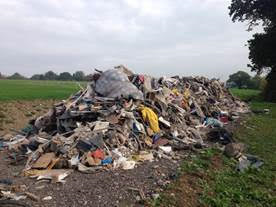Fly tipping has spiralled out of control and action must be taken to protect the countryside, according to the Ulster Farmers’ Union.
“Northern Ireland’s rural roads and hedgerows have fallen foul to the actions of fly-tipping with the inappropriate disposal of waste increasing greatly in recent days, ” said UFU deputy president Victor Chestnutt. “Fly-tipping has become the scourge of the countryside. It’s dangerous to human health and is harmful to livestock and wildlife. There have been issues in the past where fly-tipping waste polluted watercourses and contaminated land.
“It’s disappointing that some individuals think it’s acceptable to leave their waste including scrap timber, worn tyres and in some cases the carcasses of dead and rotting animals, for others to dispose of. Removing fly-tipping waste is both costly and time consuming for farmers and other landowners. Once unwanted content is dumped on their land it becomes the responsibility of the landowner to dispose of this waste with local councils left to take ownership of waste on public land and highways. It’s not acceptable and it can’t continue.”
Spring weather and coronavirus (COVID-19) restrictions have encouraged many to complete maintenance tasks at home. However, council recycling centres are closed, meaning householders are required to keep their rubbish until centres re-open or passed to a licensed carrier for appropriate disposal. Fallen animals should be disposed of through the National Fallen Stock Scheme.
“I encourage all farmers to register to become a member of the National Fallen Stock Scheme and make use of its services. Householders should ensure they make use of authorised waste disposal operators if their waste level exceeds the limits of domestic waste collection services. No one wants to deal with anyone else’s mess so please do your bit to dispose of your waste correctly.
“The UFU will continue to engage with other stakeholders to ensure that Northern Ireland’s waste permitting regime is strengthened appropriately. Work is also on-going so that further consultation occurs regarding any waste exemptions regime which can often be used to hide waste crime,” said Chestnutt.
All incidences of fly-tipping should be reported to your local council who will investigate the incident and will hold those individuals who engage in such activities responsible.

Previous ArticleComment: Our key workers are feeding this nation
Next Article ‘Meals on Wheels’ gets a boost from Moy Park
Chloe Ryan
Editor of Poultry Business, Chloe has spent the past decade writing about the food industry from farming, through manufacturing, retail and foodservice. When not working, dog walking and reading biographies are her favourite hobbies.

